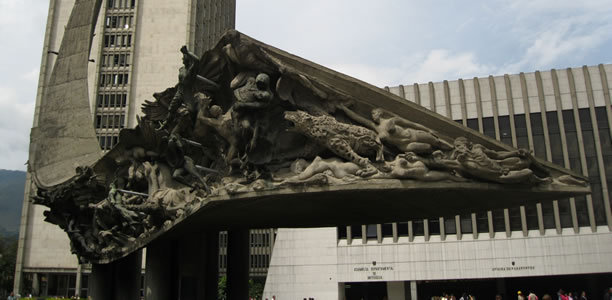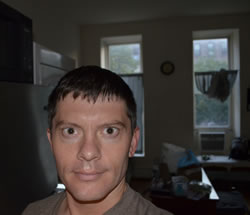|
Alter ego is a familiar term. It means "Other I" in Latin and may designate a second self, a mirror reflection or the kind of scarcely masked double (or a double "thinly disguised," in the words of Woody Allen's character Harry in the gently metafictional "Deconstructing Harry") like Philip Roth's Nathan Zuckerman or so many Updike characters. Yet the term extends to cover any alternative selves one might conjure, no matter how transfigured. In some measure, the grown female school teacher JK Rowling is a working class boy wizard. Jonathan Franzen is somehow a thirty-something bisexual female chef. Many authors, including Paul Auster and Scott Bradfield have been, in some capacity, dogs. John Gardner was both Grendel and a Nietzschean-minded dragon. Melville was whale and sea, among other things. Lovecraft was Nyarlahotep, Paul Bowles the howling North African desert.
I do it, too, inventing fictional representatives of the self. Not with that in mind, of course (I'm not a preacher), and not hoping to represent some "total" self (how boring would that be, if it were possible?). But my fiction comprises those parts of my "self" or "ego" (though "perspective" might be a more accurate word) that are relevant to making whatever story is at hand. A story, of course, is a bunch of verbal effects calibrated to deliver a reader into a certain emotional state. Some people argue that the human subject only perceives the outer world as representative of his inner being. Think of the scene in Being John Malkovich where John Malkovich enters his own mind and perceives himself in the act of perceiving (Haven't seen? Check YouTube). Woe unto the individual subject, for he is forever trapped within himself, and so on. Such worldviews overestimate language's role in the world; they also bear the spunky odor of adolescence. But there is a tendency among writers, especially beginners, to write in a way that is self-blind, to start with a character and set of circumstances that lead to both conflict and resolution. (In fact, all stories probably originate like this, in self-blindness—it's the source of the mystery compelling us onward. However, at some point—revision, for me—the writer must open her eyes and prepare the material for her audience.)
This is one reason we have creative writing workshops—to speed the writer's recognition of what she has written. There are risks. Writers may be embarrassed or defensive when they discover underdeveloped characters and plots, when they find they've revealed more than intended, or when their primary hope was to be "understood." It is especially painful when a writer thinks the audience has responded unfairly to what he thinks is a sympathetic case. An old saw seems appropriate: growing up is hard.
Yet justice exists: plenty of self-obsessed, self-blind writers succeed. Many are wildly prolific. I'll let the reader make a personal list of successful authors who write more or less nakedly about themselves, telling the same stories over and over.
But some of us tire of repeating ourselves. We wish to escape our stories, to write a new one. This requires change. Our correlatives in Greek myth are Theseus and Daedalus, who escape Crete through both invention and personal sacrifice. There is a way, and a cost. We must get outside ourselves, and the only way—the only way I know—is through discomfort. We must repeatedly experience the uncomfortable and strange, especially the things we fear, and discover ourselves in relation to them. We must meet the richer, the smarter, the dumber, the poorer, the meaner, the prouder, the different, and the very different. Only through contact with other (alter) minds do we learn of unknown capacities, limits, and potentials: fiction's primary sources.
So go outside. Alter. Remember that the familiar and comfortable is the suburbia of the spirit. Assume you know nothing—it's probably closer to the truth. Admit that people-watching is overrated, that there are more things in heaven and earth than in what passes for your philosophy. Art requires suffering, just not the kind you thought. Stop acting like a child, wherever and however you do. Start talking to strangers. Remember to listen. The writer in you will take care of the rest.

The Monumento a la Raza in Medellín, shown here only partially, conveys an epic tale of transformation through sculpture. I think it makes a worthy allegory for the ambitions of any fiction writer.
|



